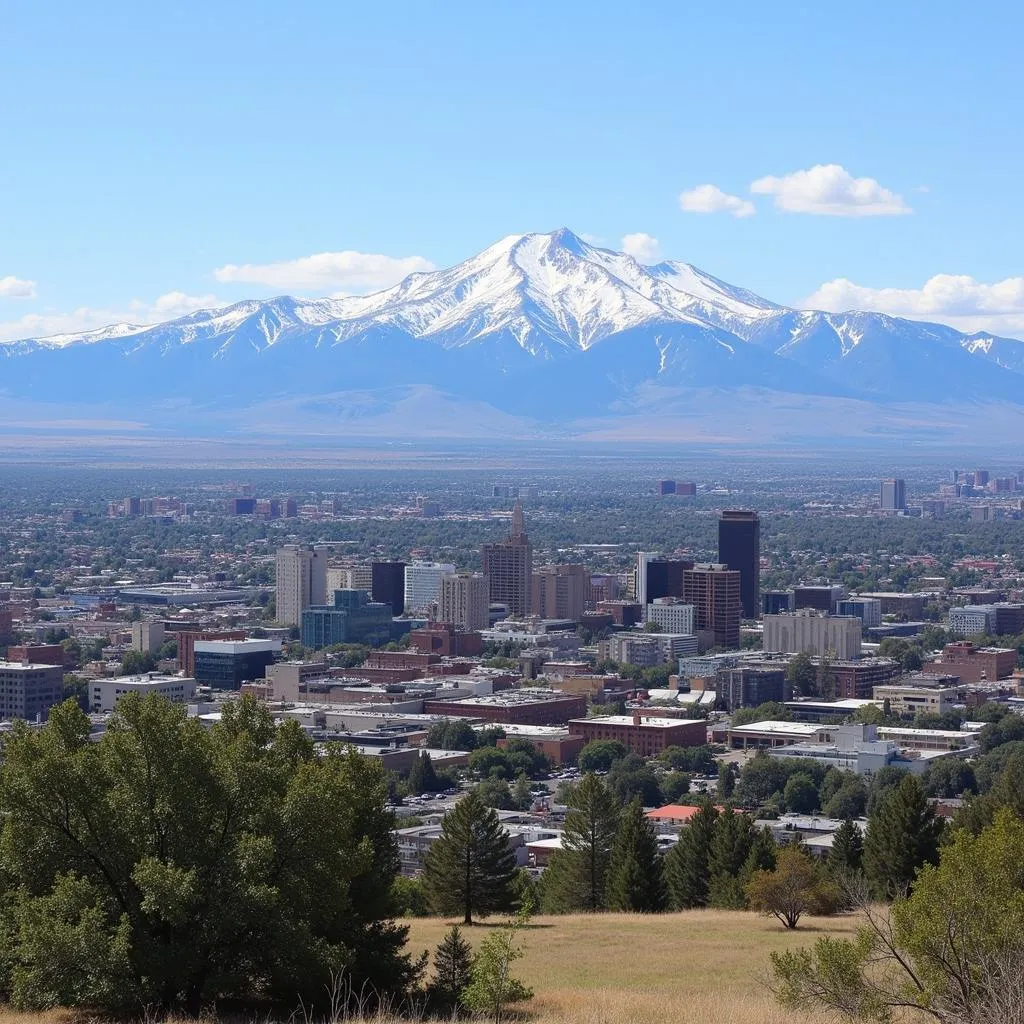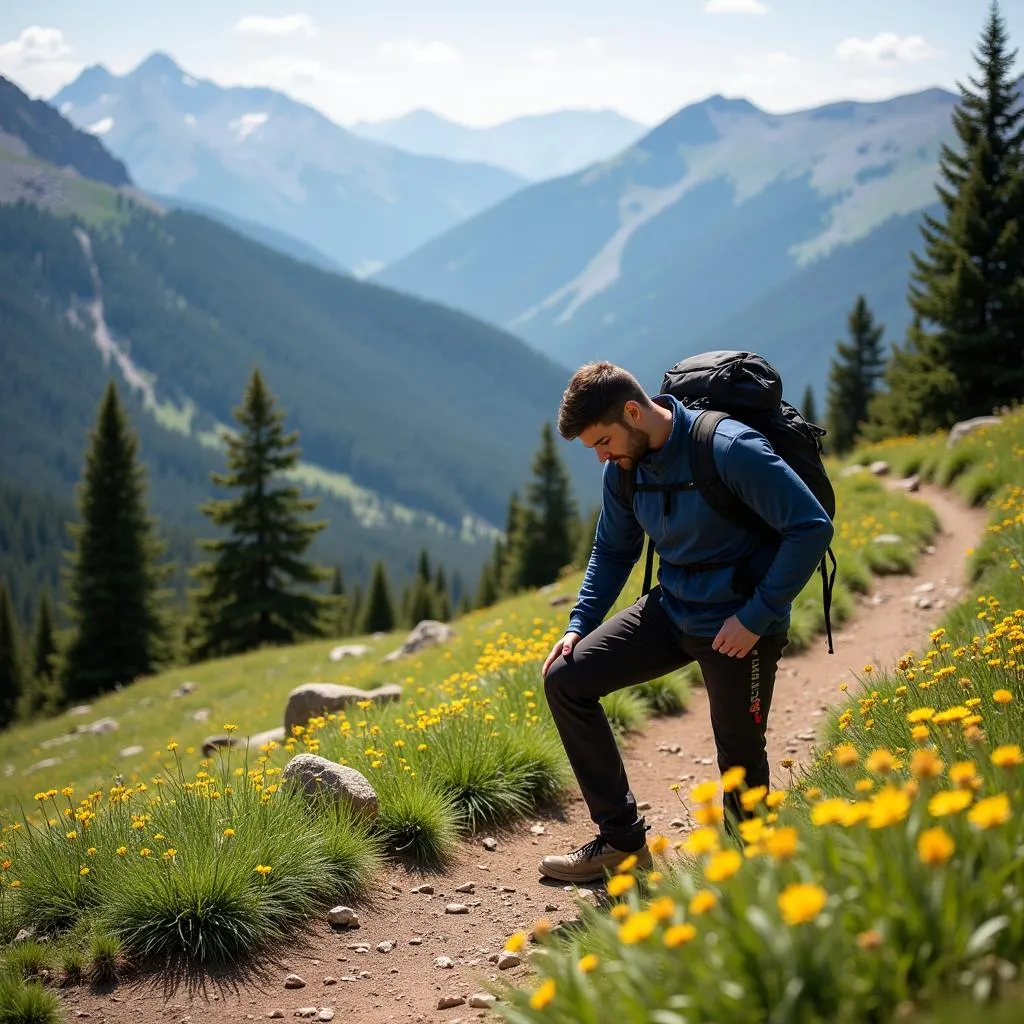Colorado Springs, a city nestled at the foot of the majestic Pikes Peak, is known for its stunning natural beauty and outdoor recreation opportunities. One question that often comes up, especially for visitors planning a trip, is “What is Colorado Springs elevation?”
The elevation of Colorado Springs is approximately 6,035 feet (1,840 meters) above sea level. This high altitude has significant implications for the city’s climate, lifestyle, and even the way visitors acclimate.
Understanding Elevation and its Impact
Before diving into the specifics of Colorado Springs’ elevation, let’s clarify what elevation means and why it matters. Elevation refers to the height of a location above a fixed point, usually sea level. The higher the elevation, the thinner the air becomes. This thinner air contains less oxygen, which can lead to a range of physiological responses, especially for people not accustomed to high altitudes.
 Colorado Springs Cityscape with Pikes Peak
Colorado Springs Cityscape with Pikes Peak
Colorado Springs Elevation Compared to Other Cities
To put Colorado Springs’ elevation in perspective, let’s compare it to some other well-known cities:
- Denver, Colorado: 5,280 feet (1,609 meters)
- Los Angeles, California: 285 feet (87 meters)
- New York City, New York: 34 feet (10 meters)
As you can see, Colorado Springs sits significantly higher than cities at or near sea level. This difference in elevation can cause noticeable changes in how your body feels and functions.
Acclimating to Colorado Springs’ Elevation
For many visitors, especially those arriving from lower elevations, adjusting to Colorado Springs’ elevation might take a little time. Here are some common effects of altitude sickness and tips for acclimating:
- Altitude Sickness: Headaches, fatigue, dizziness, and shortness of breath are typical symptoms.
- Hydration is Key: Drink plenty of water to combat the dry air and help your body adjust.
- Take it Easy: Avoid strenuous activities upon arrival. Gradually increase your activity level over a few days.
- Listen to Your Body: Rest when you need it and don’t hesitate to seek medical attention if symptoms persist or worsen.
 Hiker on a Mountain Trail in Colorado
Hiker on a Mountain Trail in Colorado
How Colorado Springs’ Elevation Shapes the City
The elevation of Colorado Springs is more than just a number; it profoundly influences various aspects of the city:
- Climate: The high elevation contributes to a dry, sunny climate with over 300 days of sunshine per year. However, nights can be cool, even in summer.
- Outdoor Recreation: The thinner air at higher altitudes can make physical activity more challenging, but the breathtaking scenery and abundance of trails make it all worthwhile.
- Health and Wellness: The lower oxygen levels at high altitudes can stimulate red blood cell production, which can be beneficial for athletes in training.
Exploring Colorado Springs and Beyond
Colorado Springs’ elevation is just one of the many factors that make it a unique and compelling destination. From the iconic Garden of the Gods to the thrill of summiting Pikes Peak, the city offers a blend of natural wonders, urban amenities, and a vibrant cultural scene.
If you’re planning a visit to Colorado Springs, embrace the elevation and all that comes with it. Drink plenty of water, pace yourself, and most importantly, savor the experience of being in this beautiful high-altitude city. What is elevation of colorado springs is a question worth exploring further to understand the city’s unique character.
Are you curious about how the elevation changes as you venture further out from Colorado Springs? Find out where is elbert county colorado located in relation to Colorado Springs and how the elevation differs.
Frequently Asked Questions about Colorado Springs Elevation
1. What is the highest point in Colorado Springs?
The highest point within Colorado Springs city limits is Pikes Peak, towering at an impressive 14,115 feet (4,302 meters).
2. Is it harder to breathe in Colorado Springs?
The thinner air at higher elevations contains less oxygen, so you might notice a difference in your breathing, especially during physical activity.
3. How long does it take to acclimate to Colorado Springs’ elevation?
Most people acclimate within a few days. However, it can vary depending on the individual and the altitude difference they are adjusting to.
4. Can I drink alcohol at a higher elevation?
Yes, but be mindful that the effects of alcohol can be felt more strongly at higher elevations.
5. Should I consult a doctor before traveling to Colorado Springs?
If you have any pre-existing health conditions, it’s always a good idea to consult your doctor before traveling to a high-altitude destination.
Want to Learn More About Colorado?
Here are some other interesting questions you might find helpful:
- How far is Winter Park Colorado from Denver Colorado?
- How far is Aspen Colorado from Denver Colorado?
- Is Colorado Springs higher than Denver?
Need assistance planning your Colorado adventure? Contact us at 0373298888, email us at [email protected], or visit us at 86 Cầu Giấy, Hà Nội. Our team is available 24/7 to answer your questions.

